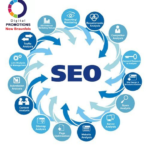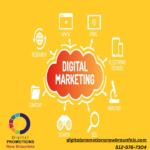Search Engine Optimization (SEO) has evolved significantly over the years. From the early days of keyword stuffing to the sophisticated algorithms of today, SEO practices have become an integral part of digital marketing. Understanding SEO involves not just knowing about keywords and links, but also how search engines work and how users interact with online content.
The evolution of SEO practices has been remarkable. In the early 2000s, SEO was primarily about inserting keywords into content, often without regard for quality or relevance. As search engines evolved, they started favoring content that provided real value to users. This shift has led to the development of more nuanced and sophisticated SEO strategies.
The Role of SEO in Digital Marketing
In today’s digital era, SEO plays a pivotal role in any marketing strategy. It’s not just an isolated tool but a significant player in the larger game of digital marketing. When integrated effectively with other marketing efforts, SEO can amplify your online visibility, driving more traffic and ultimately, conversions.
SEO’s impact on online visibility can’t be overstated. By optimizing for search engines, businesses ensure that their content is more likely to be seen by potential customers. This increased visibility leads to more organic traffic, which is often more valuable than traffic from other sources due to its higher engagement and conversion rates.
Keywords: The Foundation of SEO
Keywords are the building blocks of SEO. The process of researching and selecting the right keywords is critical to the success of any SEO strategy. It involves understanding not just what terms your potential customers are searching for, but also the intent behind those searches.
Keyword optimization techniques involve strategically placing chosen keywords in your content without overusing them, a practice known as keyword stuffing. It’s a delicate balance of making your content relevant and searchable while keeping it natural and reader-friendly.
On-Page SEO: Optimizing Website Content
Quality content is the cornerstone of on-page SEO. It’s not just about using the right keywords, but also about creating content that is informative, engaging, and valuable to your audience. This includes everything from the main body of text to the images and videos you use.
Meta tags, like title tags and meta descriptions, play a significant role in on-page SEO. They provide search engines with concise summaries of what your page is about, helping your content rank for the relevant queries.
Off-Page SEO: Building Your Site’s Authority
Off-page SEO primarily involves building your site’s authority through link building strategies. This includes getting other reputable websites to link to your content, which signals to search engines that your site is a credible source of information.
Social media also plays a crucial role in off-page SEO. While social media signals don’t directly impact search rankings, having a strong social presence can amplify your content and increase its reach, indirectly boosting your SEO efforts.
Technical SEO: Ensuring a Solid Foundation
Technical SEO focuses on making your website easy for search engines to crawl and index. This includes optimizing website speed and ensuring your site is mobile-friendly. With the increasing use of smartphones for internet browsing, mobile optimization is no longer optional.
Site architecture and user experience are also key aspects of technical SEO. A well-structured website with a clear navigation path not only helps search engines understand your site better but also provides a better experience for users, reducing bounce rates and increasing engagement.
Local SEO: Capturing Local Markets
Local SEO is essential for small businesses looking to target customers in their geographic area. It involves optimizing your online presence to appear in local search results, which often includes managing local listings and encouraging customer reviews.
These local listings and reviews can significantly impact your visibility in local search results, helping you attract more customers from your community. Ensuring accurate and consistent information across all platforms is vital to the success of local SEO.
SEO Analytics and Reporting
Analyzing and reporting are critical for understanding the effectiveness of your SEO strategies. There are numerous tools available for tracking SEO performance, from Google Analytics to specialized SEO platforms. These tools help you measure everything from traffic and rankings to conversion rates.
Interpreting data is crucial for continuous improvement in SEO. It’s not just about tracking metrics, but understanding what they mean for your business and how you can use this information to refine your strategies. Regular analysis ensures that your SEO efforts are aligned with your business goals and are adapting to the ever-changing online landscape.
Common SEO Myths and Misconceptions
The world of SEO is riddled with myths and misconceptions, often leading to ineffective or harmful practices. Debunking these myths is essential for anyone looking to succeed in SEO. For instance, the idea that keyword stuffing improves rankings is a long-disproven tactic that can actually harm your website’s standing.
Best practices in modern SEO focus on creating high-quality, user-centric content and building a strong, organic online presence. It’s about understanding the nuances of how search engines work and using this knowledge to enhance, rather than manipulate, your website’s visibility.
SEO for E-commerce Websites
SEO for e-commerce websites presents unique challenges and strategies. Unlike content-focused sites, e-commerce sites need to optimize their product pages to attract and convert customers. This involves not just the right keywords, but also high-quality images, compelling product descriptions, and an easy-to-navigate layout.
Optimizing product pages for search engines is just as important as optimizing for users. This includes everything from the URL structure to meta tags, ensuring that each product page is an opportunity to attract potential customers.
Content Marketing and SEO
Content marketing and SEO are deeply intertwined. Creating SEO-friendly content is about crafting articles, blogs, and other forms of content that not only rank well in search engines but also provide real value to your audience. This involves a deep understanding of your audience’s needs and preferences, as well as the ability to create compelling and informative content.
The role of blogs and articles in SEO cannot be overstated. They are not just platforms for incorporating keywords but are also essential for establishing your site as an authoritative source in your field. Regularly updated, high-quality content can significantly boost your SEO efforts.
Voice Search Optimization: The Future of SEO
As voice search becomes more prevalent, optimizing for this new trend is becoming crucial. Preparing for voice search trends involves understanding how people use voice commands differently than typed queries and adapting your SEO strategy accordingly.
Adapting SEO strategies for voice search means focusing on natural language and question-based queries. As voice searches are often more conversational, your content needs to reflect this shift to remain relevant and visible in this evolving search landscape.
Mobile SEO: Optimizing for the Mobile-First World
The shift to a mobile-first world has made mobile SEO more important than ever. Mobile-friendly websites are not just a convenience for users but a necessity for maintaining search rankings. This includes responsive design, which ensures that your website adapts to any screen size, providing a seamless experience for mobile users.
The importance of responsive design in SEO extends beyond just user experience. Search engines like Google prioritize mobile-friendly websites in their rankings, making mobile optimization a critical component of your overall SEO strategy.
The Impact of Artificial Intelligence on SEO
Artificial Intelligence (AI) is reshaping SEO in significant ways. AI algorithms are increasingly used in search engines to provide more accurate and relevant search results. Understanding how AI influences search algorithms is essential for staying ahead in SEO.
Adapting to AI-driven SEO means focusing on the quality and relevance of your content more than ever. As AI becomes more sophisticated, the ability to manipulate rankings with outdated tactics is diminishing, emphasizing the importance of genuine, high-quality content.
Hiring SEO Professionals: What to Look For
When considering hiring SEO professionals, it’s crucial to know what to look for. The right SEO service provider should not only have a deep understanding of all aspects of SEO but also a track record of successful implementations. It’s about finding someone who can tailor their strategies to your specific needs and goals.
The benefits of professional SEO services are numerous. From saving time and resources to gaining access to expert knowledge and tools, a professional can transform your online presence and help you achieve your digital marketing objectives.
Unveiling the Power of SEO Services: A Comprehensive Guide
In this comprehensive guide, we have explored the multifaceted world of SEO services. From on-page tactics to technical considerations, SEO encompasses a wide range of strategies and practices. The future of SEO services looks bright, with ongoing advancements in technology and a deeper understanding of how search engines and users interact.






